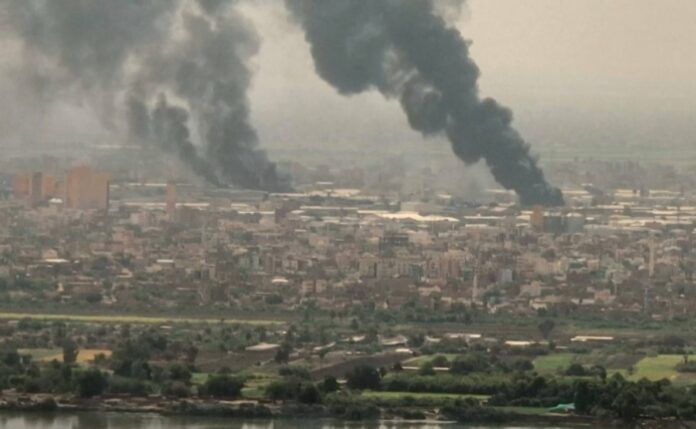| Translate This News In |
|---|
As intense fighting between Sudan’s army and paramilitaries began its third week, violating a new truce, warplanes on bombing flights received heavy anti-aircraft fire over Khartoum on Saturday.
Since fighting broke out on April 15 between the forces of Abdel Fattah al-Burhan, the army chief, and Mohamed Hamdan Daglo, the paramilitary Rapid Support Forces (RSF) commander, more than 500 people have died.
Although they have agreed to several truces, none of them have been able to hold as the number of dead civilians keeps rising and chaos and lawlessness engulf Khartoum, a city of five million people where many residents have been cooped up in their homes without food, water, or electricity.
Tens of thousands of people have been forced from their homes in Sudan or have made the difficult journey to adjacent Chad, Egypt, South Sudan, and Ethiopia to escape the fighting.
UN Secretary-General Antonio Guterres said on Saudi-owned Al Arabiya television that there is “no right to continue fighting for power when the country is falling apart.”
The most recent three-day truce, which will end at midnight (2200 GMT) on Sunday, was reached through mediation on Thursday, which was coordinated by the United States, Saudi Arabia, the African Union, and the United Nations.
The sound of fighter jets and anti-aircraft weaponry blazing all over our neighbourhood woke us up once more, a witness in south Khartoum told AFP.
Another reported that fighting had persisted since early in the day, particularly near the Omdurman branch of the national broadcaster.
Other witnesses described machine gun fire exchanges taking place in the north of Khartoum, while gunfire could be heard in Burri to the east of the city.
The vicinity of Khartoum Airport was covered in smoke.
Trading offences
As the fighting continued, the opposing generals—who had taken control in a coup in 2021—attacked one another in the media, with Burhan calling the RSF a militia that aims to “destroy Sudan” and Daglo calling the army chief “a traitor.”
African-led mediation attempts have Guterres’ full support.
According to numbers released by the health ministry on Saturday, at least 528 people have died and 4,599 have been injured as a result of the violence.
According to the UN, the violence in Khartoum, the states of Blue Nile and North Kordofan, as well as the western part of Darfur, has caused about 75,000 people to flee their homes.
Foreigners and international staff have also left in large numbers as a result of the fighting.
In the most recent seaborne evacuation to the kingdom, a ferry carrying some 1,900 evacuees arrived at a Saudi military facility in Jeddah on Saturday. They had travelled from Port Sudan.
They were among the over 4,880 individuals who were transferred to safety in the country, according to the Saudi foreign ministry.
The State Department reported that a convoy led by the US and including Americans, local workers, and people of allies countries landed in Port Sudan on Saturday to join the Red Sea migration.
After airlifting more than 1,500 people this week, Britain announced that its evacuation missions were coming to an end.
In a nation where 15 million people, or one-third of the population, already depend on help to avoid famine, the World Food Programme has warned that the violence could drive millions more people to starvation.
Extremely concerned
According to the UN, El Geneina, a city in West Darfur state, has seen at least 96 fatalities this week.
The society in Darfur is disintegrating, and tribes are already attempting to arm themselves, according to Guterres, who described the situation as catastrophic.
According to reports, there has been widespread property destruction, looting, and burning, including in displaced persons’ camps, according to Doctors Without Borders (MSF).
MSF’s deputy operations manager for the Sudan, Sylvain Perron, stated that the conflict had compelled the organisation to cease practically all of its work in West Darfur.
“We are extremely concerned about the effects of this violence on people who have already experienced waves of violence in the past years.”
Darfur is still suffering the effects of a conflict that broke out in 2003 when then-hardline president Omar al-Bashir sent the Janjaweed militia, which was primarily made up of Arab pastoralist tribes, into battle against rebels from ethnic minority groups.
According to UN statistics, the scorched-earth campaign resulted in at least 300,000 fatalities and almost 2.5 million displaced persons. Bashir was charged by the International Criminal Court with war crimes, crimes against humanity, and genocide in connection with the campaign.
The RSF was formally founded in 2013 and afterwards developed from the Janjaweed.
The switch to elected civilian administration that was put into motion when Bashir was overthrown in the wake of widespread protests in 2019 was interrupted by the coup that installed Burhan and Daglo in office in 2021.
The current disagreement between the two generals stemmed from the RSF’s proposed incorporation into the regular army.


















